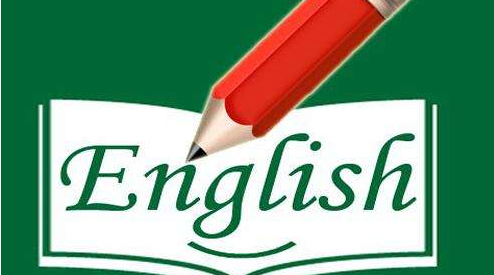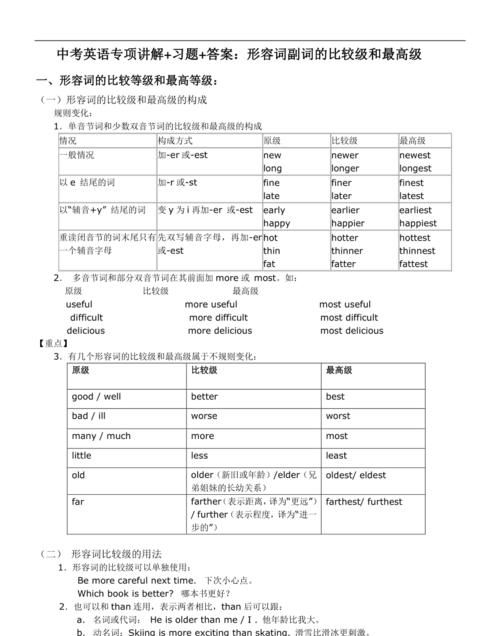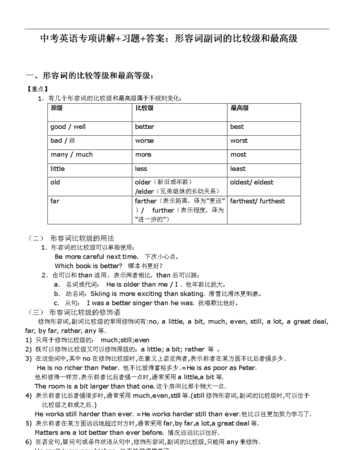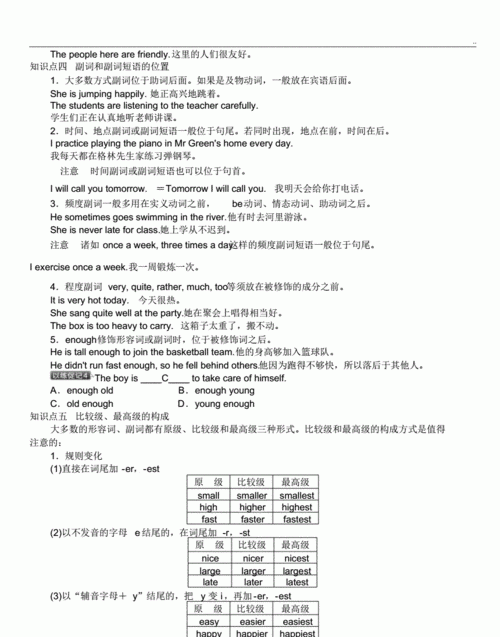本文目录
中考英语语法必考知识点汇总
具体如下:
一、词类十种
名词、形容词、代词、数词、冠词、动词、副词、介词、连词、感叹词。
1、名词(n.): 表示人、事物、地点或抽象概念的名称。如: boy, morning, bag, ball, class,or ange.
2、代词(pron.):主要用来代替名词。 如: who, she, you, it .
3、形容词(adj..):表示人或事物的性质或特征。如: good, right, white, orange.
4、数词(num.):表示数 目或事物的顺序。如: one, two, three, first, second, third, fourth.
5、动词(v.):表示动作或状态。 如: am,is, are, have, see.
6、副词(adv.):修饰动词、 形容词或其他副词,说明时间、地点、程度等。如: now,very, here,often,quietly, slowly.
7、冠词(art..): 用在名词前,帮助说明名词。如: a, an, the.
8、介词(prep.): 表示它后面的名词或代词与其他句子成分的关系。如in, on, from, above, behind.
9、连词(conj.):用来连接词、 短语或句子。如and, but, before.
10、感叹词(interj..)表示喜、怒、哀、乐等感情。如: oh, well, hi,hello.
二、句子成分七种
1、主语是句子所要说的人或事物,回答是“谁”或者“什么”。通常用名词或代词担任。如: !’mMiss Green. (我是格林小姐)。
2、谓语动词说明主语的动作或状态,回答“做(什么)”。主要由动词担任。如: Jack cleans the roomevery day. (杰 克每天打扫房间)。
3、表语在系动词之后,说明主语的身份或特征,回答是“什么”或者“怎么样”。通常由名词、代词或形容词担任。如: My name is Ping ping . (我的名字叫萍萍)。
4、宾语表示及物动词的对象或结果,回答做的是“什么”。通常由名词或代词担任。如: He can spellthe word. (他能拼这个词)。
有些及物动词带有两个宾语,一个指物,一个指人。指物的叫直接宾语,指人的叫间接宾语。间接宾语一般放在直接宾语的前面。如: He wrote me a letter . (他给我写了一封信)有时可把介词to或for加在间接宾语前构成短语,放在直接宾语后面,来强调间接宾语。如: Hewrote a letter to me . (他给我写 了一封信)。
5、定语修饰名词或代词,通常由形容词、代词、数词等担任。如:Shanghai is a big city . (上海是个大城市)。
6、状语用来修饰动词、形容词、副词,通常由副词担任。如: He works hard . (他工作努力)。
7、宾语补足语用来说明宾语怎么样或干什么,通常由形容词或动词充当。如: They usua Ily keeptheir classroom clean. (他们通常让教室保持清洁) / He often helps me do my lessons. (他常常帮我做功课) / The teacher wanted me to learn French all by myself. (老师要我自学法语)。

三、转换法
(1)形容词→动词,如: dry (干燥的)→dry(弄干), clean (干净的)→clean(打扫,弄干净),等等。
(2)动词→名词,如: look, walk, rest, work, study, swim, go, talk 等等。
(3)名词→动词,如: hand(手) →(传递), face (脸)→(面对)等等。
(4)形容词→副词,如: early→early, fast →fast等等。
(5)副词-→连词,如: when(什么时候) →.....时候),等等。
(6)介词→副词,如: in(到....里)→(在里面;在家), on(在...上)→(进行,继续),等等。
四、专有名词和普通名词两大类
1、专有名词是个别的人、地、物、团体、机构等的专用名称。
专有名词中实词的第一个字母要大写。如: Beijing,Tom, the People’s Republic of China,专有名词如果是含有普通名词的短语,则必须使用定冠词the。如:theGreatWall(长城)姓氏名如果采用复数形式,则表示该姓氏一家人(复数含义),如: the Greens( 格林家人)。
2、普通名词是许多人或事物的共有名称。如: pupil, family, man, foot.普通名词又分为可数名词和不可数名词。可数名词是可以用简单的数词进行计数的名词,如: box, child, orange;不可数名词是不可以用简单的数词进行计数的名词。如: water, news, oil, populat ion,information.
五、名词所有格
(1)表示人或其它有生命的东西的名词常在词尾加’s。 如: Childern' s Day(儿童节),mysister’s book (我姐姐的书)。
(2)以s或es结尾的复数名词。只在词尾加’。如: Teachers' Day (教师节)。
(3)有些表示时间、距离以及世界、国家、城镇等无生命的名词,也可在词尾加’s. 如:today's newspaper (令天的报纸),ten minutes break (土分钟的课间休息),China' s populat ion (中国的人口)。
(4)无论表示有生命还是无生命的东西的名词,一般均可用介词of短语来表示所有关系。如:a fine daughter of the Party (好女儿)。
初中形容词副词的比较级和最高级
3个比较级别
形容词大多可以比较,有3个比较级别。形容词的原来形式称为原级:
This house is small.
He is a wise man.
I found this horse very fast.
表示一样东西或人比另一样东西或人“更……”的形容词,称为这个形容词的比较级,单音节形容词的比较级由该词加词尾-er构成:
This house is smaller than yours.
These houses are smallerthan those.
He is a wiser man than his father.
I found this horse faster than that.
表示在3个或更多的东西或人中“最……”的形容词,称为这个形容词的最高级,单音节词以加-est方式构成最高级:
This house is the smallest of all.
These five houses are thesmallest of all.
He is the wisest man in this city.
I found this horse fastest of all.
I found these horses fastest ofall.
双音节或多音节形容词,多以前面加more的方式构成比较级,以加most 的方式构成最高级:
This house is beautiful.(原级)
He is a cunning man.
I found the horse very useful.
This house is more beautiful(比较级)than yours.
He is a more cunning man than his brotner.
I found the horse more useful than that one.
This house is the most beautiful(最高级)of all.
He is the most cunning man I ever saw.
I found the horse the most useful of all.
还有一种比较方法,即往下比,表示“较不……”,“最不……”,这时可以分别在形容词前加less或least。由less构成的比较级称为较低级(Comparative of Inferiority),以least构成的最高级称为最低级(Superlative of Inferiority):
This house is less beautiful(不如……美) than yours.
He is a less cunning man than his brother.
This house is the least beautiful(最不美) of all.
He is the least cunning man thatI ever saw.
副词也可以同样方式进行比较:
John ran fast—faster thanI—the fastest of all.
He writes carefully—more carefully thanI—the most care-fully in class.
变化形式:
1 ,单音节形容词、副词通常都以加-er和-est的方式构成其比较级和最高级:
但在加词尾时要注意:
1)一般加-er,est
2)以-e结尾的词,只加-r和-st
3)“辅音字母+元音字母+辅音字”(简称CVC)构成的词,末尾字母要双写,再加-er和-est
2 ,以y结尾的词,先变y为i,再加词尾,如happy,happier,happiest
3,上面未提到的双音节词,通常多加more和 most
4,三音节或更多音节的词通常都加more和most
5,双音节副词,特别是以-ly结尾的,大多加 more和most
6,还有一些形容词有不规则的比较形式:
good(well)better best
bad(ill,evil)worse worst
many(much)more most
little less(lesser)least
old older(elder)oldest(eldest)
late later(latter)latest(last)
far farther(further)farthest(furthest)
nearnearernearest(next)
无法比较的形容词与副词
大多数品质形容词都可进行比较,但某些形容词是绝对的,无法比较的。我们可以说 nearly perfect,quite empty,almost dead,但不能说more perfect,emptier,most dead,也不能说This is rounder than that.

副词的分类及作用
副词是高考的一个基本考点。副词是一种用来修饰动词、形容词、副词或者整个 句子 的词,可说明时间、地点、 程度、频率、方式和关系等内容。下面就是我给大家带来的副词的用法分类和作用,希望大家喜欢!
副词的含义和分类
时间副词有today, yesterday, before, now, then, shortly, eventually等;
地点副词有here, there, inside, outside, aboard, abroad, downtown, downstairs, everywhere等;
方式副词有carefully, slowly, suddenly, cautiously, patiently, illegally等;
程度副词有much, very, rather, quite, hardly, almost, merely, simply, absolutely, totally, entirely,generally等;
频率副词有usually, sometimes, never, always, often, frequently等;
关系副词有thus, so, therefore, however, consequently, additionally, besides等;
还有一类副词可表示某种语气、情感,一般用来修饰全句,如:importantly, obviously, luckily, fortunately, unfortunately等。
掌握副词的分类及含义能帮助同学们快速理解语境,并熟练运用副词表达程度、关系及情感态度。
例1 (2014·全国卷Ⅱ) Everyone on the bus began talking about what the boy had done, and the crowd of strangers 70 (sudden) became friendly to one another.
解析 suddenly。sudden意为“突然”,修饰的应是谓语became friendly,而非stranger,只有副词才能修饰谓语动词,所以此处应将形容词sudden变为副词suddenly填入。
例2 (2015·广东卷) 2 (lucky), he also had a cow which produced milk every day.
解析 Luckily。此句应该表达的是“他还有头每天产奶的牛这事是幸运的”,所以填的词应该修饰全句,要用副词。luckily表达的是一种语气情感。
副词的位置
1. 修饰形容词或副词的副词一般放在所修饰的形容词或副词之前。如:
This kind of material is rather cheap. (rather修饰形容词cheap)
He got up surprisingly early. (surprisingly修饰副词early)
2. 副词若修饰谓语动词,分两种情况:
所修饰的谓语若只有实意动词,则副词一般放在实意动词之后,如listen carefully, think logically, organize well, go abroad, go downstairs等;所修饰的谓语如果既有实意动词又有助动词,则副词往往放在助动词之后、实意动词之前。如:
The population of Shanghai is rapidly increasing.
She has already resigned from this position.
了解副词的位置,能帮助判断题目考查的是不是副词。
例3 (2016·全国卷Ⅰ) Recent studies (study) show that we are far more productive at work if we take short breaks 67 (regular).
解析 regularly。第67空同学们通过观察可知形容词位于动词 短语 take short breaks之后,只能将其变为副词,因为只有副词才能修饰动词,且副词修饰实意动词时一般位于实意动词之后。
例4 (2016·全国卷Ⅰ) The title will be 63, (official) given to me at a ceremony in London.
解析 officially。此句的谓语结构为will be given, 分析可知只有副词才能修饰谓语动词,且副词放在助动词之后、实意动词之前,符合表达习惯,所以此空需将official变为officially填入。
特殊情况
1. 不是所有的副词都是-ly结尾,带-ly后缀的词不一定是副词,比如likely, lovely, friendly, lively, deadly, weekly, daily就是形容词。
2. 有类动词像系动词一样可以用主动形式表达被动意义,但是它们不是系动词,因而其后要接副词而不是形容词。如:
The book sells well.
The cloth dries easily.
3. 有的副词加-ly后缀还是副词,但意思有所改变。如:
We should study hard.
He can hardly get in touch with the boss.
这里hardly为表达否定意义的副词。又如:deep, wide, high, direct等副词变为deeply, widely, narrowly, highly, directly后意义由具体变为抽象。试比较:
The rescuers are digging deep.
I’m deeply touched by his words.
Open your mouth wide.
English is widely used all over the world.
The plane can fly high.
The headmaster thought highly of my sister.
You can fly to Paris direct.
Directly after lunch we were packed and ready to go.
4. 有些副词与现在进行时或过去进行时连用,表达的是喜恶等情感、态度。这些副词有forever, always, often, constantly等。如:
He is constantly scolding me.
Mary is always helping others.
5. 还要注意对副词的比较级或最高级的考查。
例5 (2014·广东卷) After our plane landed, we went to the hotel. We had made our reservation six months 17 (early), but the man at the front desk said there had been a mistake.
解析 earlier。此句中表达的是“早在六个月前就订好了宾馆”,所以考查的是early的比较级earlier“更早的时候”。
6. 还有可能考查特殊句式,如the more ..., the more ...。
例6 (2014·辽宁卷) The 68 (hard) you try to beat him, the more likely you will get hit.
解析 harder。此句意为“你打他打得越狠,你自己受到打击的可能性越大”。用的是特殊句式the more ..., the more ...,故应将hard变为harder。
7. 最后还有一些副词随着时间的推移具有了连词的功能,可以引导状语从句。如:
The girl burst into tears immediately she saw her mother.
All the students became silent instantly they caught a glimpse of their headteacher.
在这里immediately, instantly表示“一……就……”,相当于as soon as/the moment, 起的是连词的作用。
总之,在我们掌握了副词的含义、用法及相关注意事项的前提下,遇到语法填空题中的形容词,就要判断它修饰的对象:如果修饰谓语动词、形容词、副词或全句,就可直接将它变为副词;如果空中给的是副词,则很可能考查它的比较级、最高级。
副词的用法分类和作用相关 文章 :
1. 副词及其基本用法归纳
2. 副词的用法
3. 英语副词的用法:副词修饰形容词、数词、名词等
4. 形容词和副词的用法总结
5. 关于英语副词的用法
6. 中考英语形容词 副词 连词语法知识复习
7. 英语数词的分类和用法
8. 高考英语语法填空副词知识点与练习题
9. 关于all的用法及解释
10. 常见词some的用法及解释

形容词和副词的相关内容有哪些
在中考单项选择中形容词也占一定比例,一般考查有关形容词或副词的一些搭配,但绝大部分考查形容词与副词的比较级和最高级。
一、形容词和副词的比较级和最高级
①一般的'比较级和最高级在形容词或副词后加-er或-est,如:small —— smaller —— smallest
②以不发音-e结尾的形容词或副词直接加 –r或 –st,如large —— largest —— largest
③重读闭音节词尾是一个辅音字母的,需双写该辅音字母,再加-er或-est.
④以辅音字母加 y 结尾的形容词和副词,把“y”变“i”,再加 –er或-est.busy——busier——busiesthappy——happier——happiest
但一些双音节及多音节形容词或副词前要加more和most,如:slowly —— more slowly —— most slowlydifficult——more difficult——most difficultbeautiful——more beautiful——most beautiful; 但还有一些不规则的变化:good / well——better——bestmany——more——mostbad / ill / badly ——worse——worstlittle——less——leastfar —— farther / further —— farther / furthest
二、形容词和副词的等比句型
①as…as… 和……一样 I’m as tall as you.
②not as(so)…as 不和…… 一样(在否定句中常用so 来代替as)
如,I can’t run so fast as you.
另外as…as possible 为固定结构,如,as soon as possible, as quickly as possible 等。
在以上两个句型中形容词或副词一定要用原级。
三、形容词和副词的其它句型还有:
①形容词/ 副词 比较级 + than 句型 ,在than 后面的人称代词 用主语和宾语均可。He is older than I / me. 但是如果人称代词后有动词时,则只能用主格形式。如, Tom found more red leaves than I did.
②“the + 比较级, the + 比较级” 结构表示两个变化一起发生。如, The more you learn, the more you’ll know.
③“more and more”结构(指两个形容词比较级用and 连接)表示持续不断的变化。 如: I’m getting thinner and thinner.
四、修饰形容词和副词的比较级的副词要用much, a lot, a little, a bit, far等,very不能和比较级连用。如: The blouse I bought yesterday is a little less expensive. 昨天我买的衬衣比较便宜。To play basketball is far more enjoyable to the boy. 打篮球对于男孩子来说要有趣得多。
五、形容词的一些搭配,
如:be glad / happy/ pleased to do 很高兴做某事be sorry to do 很抱歉,很遗憾做某事be sure to do 一定/相信会做某事be ready to do 准备好做某事,乐于做某事get ready to do 为……做好准备等等。
下面我们来看一些例题。
1.The Yellow River is one of ___ in China.
A. the longest rivers B. the longer river C. the longest riverD. the long river
答案:A
2. Does he speak Chinese ___ his brother?
A. as better as B. as good as C. as well as D. best than
答案:C
3. Which shirt do you like ___, the white one or the blue one?
A. better B. good C. best D. much
答案:A
4. I don’t feel ___ to go to work today. I’m ill.
A. good enough B. well enough C. enough well D. enough good
答案:B
5. Mary would like to spend ___ days on her research.
A. a little more B. a little C. a few more D. much more
答案:C
练习:
1.Be quiet, class! I have ___ to tell you.
A. important anything B. important something
C. anything important D. something important
答案:D
2.This picture book is not ___ that one.
A. so interesting as B. so interesting than
C. as interesting than D. interesting as
答案:A
3.This article is ___ than that one.
A. much easier B. more easier c. much more easier D. more easy
答案:A
4.The Changjiang River is ___ river in China.
A. long B. longest C. the longest D. longer
答案:C
5.You must keep your room ___ and tidy.
A. to clean B. cleaning C. clean D. cleaned
答案:C

以上就是关于中考形容词和副词考点 ,中考英语语法必考知识点汇总的全部内容,以及中考形容词和副词考点 的相关内容,希望能够帮到您。

